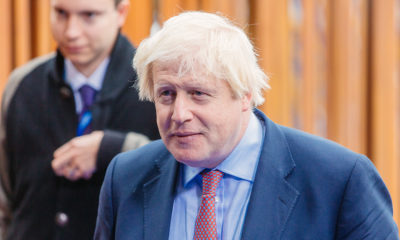
Joint Opinions
UK Papers Are Policing Social Media for Marijuana References
Cannabis legalization advocates in the UK say that constant negative stories on cannabis from The Sun and the Daily Mail are inhibiting the drug’s legalization.
Tabloid newspapers are still thriving in the United Kingdom. A full-fledged “newspaper war,” begun when the members of Monty Python were still in university, is raging on well into the digital century. This is not a good thing — especially because the two largest papers appear to be biased against cannabis.
A quick glance at the top two in the competition reveals the direction the race is headed. The top-selling paper in the country is the Rupert Murdoch-owned The Sun, a certifiable rumor-mill that owes its profile to its cheerful willingness to print whatever will gain attention, and is most notable today for its abject shamelessness. Right behind The Sun is the Daily Mail. Its owner is a member of the country’s landed gentry, who inherited both its title and the paper.
As befits two similar products vying for a similar share of the market, the papers share another quality in common besides format, editorial slant and disinterest in serious, in-depth, meaningful news coverage. They both reliably print anti-marijuana fearmongering — and they are so committed to stamping out the spectre of weed from their noble island that they are more than willing to break journalism’s fourth wall, and become part of the story themselves.
An example: Facebook has a new product called “Watch.” It’s a streaming-video service, sort of like Netflix — but without the high-quality, movie-studio or self-produced content. One of these reality shows, watchable by users as young as 13, is called “Edibles Will,” and, The Sun intoned, is “dedicated to teaching people how to use suspicious herbs in their cooking.”
It’s unclear how exposure to a cooking show involving a psychoactive plant is any different from a young child stumbling onto a show extolling the virtues of wine or a digital copy of psychedelic bible “The Teachings of Don Juan.” The average Anthony Bourdain broadcast has more scandalous content — and more appeal. But there “Edibles Will” was, and The Sun dutifully shone upon it. Facebook the took the content down, apologized and swore it would never happen again.
The anti-marijuana bias in the tabloid media, British legalization advocates say, in turn plays a key role in shaping public opinion — and reversing what gains have been made on marijuana policy. Cannabis was briefly a Class C drug in the UK, the least-serious of the country’s three categories, before it was returned to Class B in 2009, in a move critics called an “illogical” “farce.”
And so, the UK has some of the toughest drug laws of any of the Western European democracies, places most Americans associate with free healthcare, good schools and generally liberal policies.
Though Labour leader and left-wing hero Jeremy Corbyn has said he wants to decriminalize cannabis, neither of the UK’s two major political parties appear much interested in spending much political capital in changing this state of affairs. Labour has other things to worry about — and the in-power Tory government is just fine with the status quo.
United Patients Association organizer Jon Liebling told me that one of the goals of the “Cannabis Tea Party” outside Westminster, the seat of the UK’s government, was to get the media — aka the Daily Mail — to get up and take notice.
“The Daily Mail seems very keen” to perpetuate “any stigma at all,” he said.
Liebling predicted the newspaper’s reaction correctly. The Evening Standard — owned as it is by a sacked member of government who has his own political vendettas — did a write-up of the protest. The Sun and the Mail were nowhere to be found.
TELL US, do you think newspapers should police social media for marijuana-related content?


























